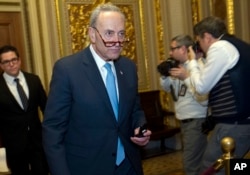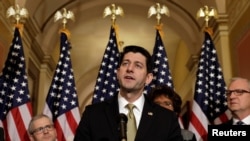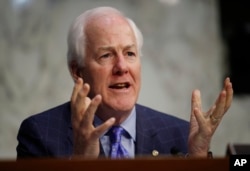A partial shutdown of the U.S. government commenced early Saturday after a funding bill was blocked in the Senate. Spending authority expired at midnight Washington time, triggering a halt of non-essential functions.
Senators resume debate Saturday afternoon on a temporary spending bill that would fund the government through Feb. 8. Democratic Senator Tammy Baldwin, however, objects to the continuing series of temporary spending bills, saying it “simply kicks the can down the road and fails to get the job done for the American people.”
On Friday, a handful of Republicans joined all but a few Democrats in opposing the funding bill, which needed three-fifths backing, or 60 votes, to advance in the 100-member chamber.
The outcome set off furious discussions among senators on and off the chamber floor, seeking a last-gasp bipartisan deal to restart the flow of federal funding.
Blame game
The White House responded immediately to the failure to reach a funding agreement. It said in a statement that the Senate Democrats are "obstructionist losers" and blamed them for what it called the "Schumer Shutdown," accusing legislators of valuing illegal immigrants ahead of lawful Americans. The statement said "When Democrats start paying our armed forces and first responders we will reopen negotiations on immigration reform."
President Donald Trump tweeted Saturday morning "Democrats are far more concerned with Illegal Immigrants than they are with our great Military or Safety at our dangerous Southern Border. They could have easily made a deal but decided to play Shutdown politics instead."
Members of the House Republican leadership echoed the White House statement.
House Republican Speaker Paul Ryan said the Democrats would “do anything to appease their base, even shut down the federal government.” He described the shutdown as a “dangerous political ploy” and “reckless.”
House Democratic Whip Steny Hoyer responded to the Republican criticism: “Knowing full well that they would need our help, Republicans insisted on a partisan process. Now, having failed to fulfill their most basic responsibility as the governing party, they are seeking to blame Democrats for refusing to be blackmailed into giving them yet another short-term extension.”
Democratic leader Nancy Pelosi said President Trump has “earned and ‘F’ for failure in leadership.”
“Despite controlling the House, Senate and White House, the Republicans are so incompetent, so negligent that they couldn’t get it together to keep government open,” she said.
Earlier, lawmakers of both parties pointed fingers, as did as President Donald Trump, who warned of repercussions from a shutdown and argued Democrats voted against funding the government as a political stunt to distract attention from the president’s economic accomplishments.
Democrat Tim Kaine countered that no one in his caucus “wants the government to shut down,” then quoted from a Trump tweet last year in which the president said America “needs a good shutdown.”
“There’s only one person that has talked about a shutdown with glee and with interest that it happen, and that’s the president,” Kaine said.
Employees idled, talks continue
Federal agencies, meanwhile, prepared to idle employees and halt major portions of their operations.
Negotiations to solve the impasse were expected to continue Saturday involving Republican and Democratic congressional leaders as well as the White House.
A meeting earlier Friday between Trump and the Senate’s top Democrat, Minority Leader Chuck Schumer of New York, failed to yield a breakthrough.
Democrats then followed through on pledges to vote down a Republican-crafted bill that would have funded the federal government through mid-February. The House of Representatives approved the bill Thursday with Republican-only votes.
Senate Democrats withheld support to press demands for congressional action on immigration and spending priorities, while insisting on an end to month-to-month government funding.
Republicans accused their Democratic colleagues of misplaced priorities.
“Millions of people, including our military, law enforcement and emergency personnel could lose their paycheck if Democrats follow through on their threat,” Senator John Cornyn of Texas said. “The time to stop playing games is now. We urge them [Democrats], we implore them: Do not shut down the government.”
Trump and congressional Republicans repeatedly asserted that Democrats will be to blame if non-essential government operations come to a halt, a charge Democrats rejected.
“When you look across the spectrum of the three branches of government, the Republicans are in control,” Senator Dick Durbin, a Democrat from Illinois, said.
Immigration
Democrats backed three previous short-term spending extensions late last year while bipartisan negotiations went forward on immigration and spending priorities. Last week, Trump rejected a bipartisan Senate immigration proposal, throwing congressional negotiations into disarray.
Democrats are demanding prompt congressional votes on an immigration reform package that would shield from deportation hundreds of thousands of undocumented immigrants brought to America as children. Republicans note that young immigrants would not face possible deportation until March, when the Deferred Action for Childhood Arrivals program, DACA, expires.
The U.S. government has shut down before, including in 2013, in a partisan deadlock over health care policy and funding. The shutdown lasted 16 days and furloughed hundreds of thousands of federal workers.
What stops and what continues during a federal shutdown varies, but federal research projects could be stalled, tax refunds delayed, processing of veterans’ disability applications delayed, and federal nutrition programs suspended, as was the case in 2013.








